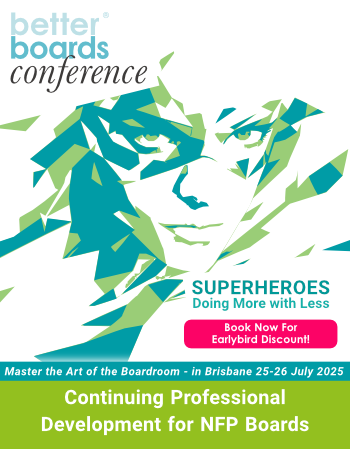governance
Board Perspectives: Key Skills for Making Constructive Contributions
Published: June 8, 2015
Read Time: 5 minutes
Board effectiveness and competency are influenced by a great many factors. Arguably a critical factor is the skills held by board members and how these are used in concert to strengthen both the board and the organisation.
To get to the bottom of what key skills should be required of all board members in order to contribute effectively in the boardroom, we put the word out to our network. We asked board members from a range of Australian non-profit organisations their perspective on this issue and the results were fascinating.
Our board members were asked the question:
What is the key skill/s you believe all non-profit board members must have (or develop) in order to make effective and constructive contributions in the boardroom?
Lesley Harris
Board Director, Karralika Programs
A thorough understanding of governance, including legal obligations ; experience across business, strategic management and familiarity and understanding of the challenges of the landscape in which their organsiations are operating; for example, government policy, funding arrangements and the non profit sector in general.
Importantly, an ability and willingness for Board Members to utilise their connections or skills has potential to provide both tangible and intangible benefits to support the organisations mission, sustainability and further development. Similarly, a passion or keen interest in the area of work being undertaken by the organisation can work to support Board Member engagement.”
Jude Pettitt
Former Chair and current board member, Mirabel Foundation
Most important is your understanding of the area that the organisation works in, if it is children and family support you need to know something about the services and the intent of the NFP work. You need to be passionate about making a difference in this area and see your board role as a way to do this. You need to make sure that there is a real alignment better your values and expectation and what the NFP wants to achieve. I believe that you need to have had broad experience in other organisations in different roles, you need to have managed people in previous roles and you need basic financial and management skills. You need to ask questions about papers and issues that come up , so an enquiring mind is a real plus you also need to be authentic in your own leadership style.
Sandra Lupi
Board Director, Mangrove Housing Ltd
I was invited to join the Board of Mangrove Housing Ltd in 2014. My initial interview with the Board and CEO confirmed my desire to apply for this Board. It was their enthusiasm and commitment to the mission of Mangrove and to its philosophy and guiding principles that matched my own.
I believe a fundamental aspect of being a Director of a not for profit Board is a passion or sincere interest in the business of the organisation and a willingness to learn more about how the organisation can achieve its mission. An essential component of duty of care is for Board members to develop a broad understanding of the organisation’s programs and priorities as a basis for financial decision making and strategic planning.
The obligations of due diligence on all Board Directors apply to not for profit Boards. There is a constant financial challenge with reliance on government funding and the ever changing policy and program changes within government that impact on the organisation. Not for profit Boards have to be financially diligent and effective or “no money – no mission” applies.
A positive relationship with the CEO is essential. Directors need to work with the CEO to enable the organisation to obtain the resources, funds and personnel necessary to implement the organisation’s strategic objectives. At the same time it is imperative that Board Directors maintain the separation between operational and governance aspects of the organisation. When the CEO provides relevant and timely information to the Board and Directors have confidence in the leadership of the CEO then sound governance practices prevail.
Stakeholder engagement at all levels -the client /consumer (in our case the tenants) the government, local councils, property owners, community organisations and potential partners – is an essential element of a not for profit Board of a community organisation. The Board’s composition needs to be diverse and include members with the availability and expertise to contribute to this.”
John Hayes
School Board Chairman, Northholm Grammar School, Arcadia, NSW
Essential Board member skills: Qualified and experienced in the expertise for which they were appointed, enthusiastic and passionate about the survival and development of the school.
Prepared to: “go the extra mile” for the benefit of the clients (students, parents and staff), take on a leadership role in their area of expertise (e.g.committee chair), spend the time necessary to fully explore/discuss issues facing the Board be visible (attend some school events).
Able to: listen to/respect alternative views – tolerance, argue their point of view in a spirit of research and collaboration, be patient and understanding.
Board members should be committed to a strong sense of co-operation, teamwork and new ideas for the good of the Board and the School. In the case of most School Boards, members must be prepared to work on a voluntary basis.”
If you have any further thoughts or opinions on the key skill/s required of board members, please leave a comment at the end of this article. To be featured in future articles like this, email us at [email protected]
Share this Article
Recommended Reading
Recommended Viewing
Author
- About
-
Better Boards connects the leaders of Australasian non-profit organisations to the knowledge and networks necessary to grow and develop their leadership skills and build a strong governance framework for their organisation.
Found this article useful or informative?
Join 5,000+ not-for-profit & for-purpose directors receiving the latest insights on governance and leadership.
Receive a free e-book on improving your board decisions when you subscribe.
Unsubscribe anytime. We care about your privacy - read our Privacy Policy .







